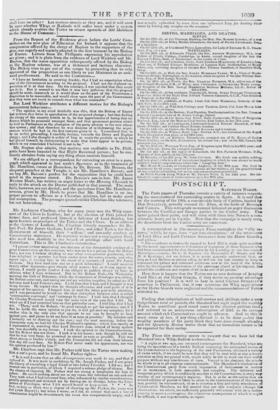From the Report of the Evidence given before the Lords'
Corn- tnittee on the new plan of Education for Ireland, it appears that the
compromise offered by the clergy of Raphoe to the supporters of the plan, was eagerly and warmly adopted in the first instance by the Bishop of Exeter. Letters from Dr. Phillpotts expressing his approbation are given ; and it is plain from the evidence of Lord Wicklow and Mr. Boyton, that the warm opposition subsequently offered by the Bishop to the Rapboe scheme, was of a dishonest and factious character. The Bishop tries to get out of the scrape by pretending that he only approved of the proposition as one likely to put Ministers in an awk- ward predicament. He said to the Committee— "I have no hesitation in avowing frankly, that I had no expectation what- ever of the Government acceding to the proposal. I had not the slightest ex- pectation of it at that time. On the contrary, I was satisfied that they could not do it. But it seemed to me that it was very judicious that the proposal should be made, inasmuch as it would show on the part of the Protestants a disposition to be reasonable, and would show upon the part of the Government that they were not really to concede even what was reasonable."
But Lord Wicklow attributes a different motive for the Bishop's inconsistent behaviour-
" The opinion in my mind decidedly was this, that the Bishop of Exeter had written that letter in approbation of the proposed change; but that finding the clergy of the country hostile to it, he was apprehensive of losing that in- fluence which he possessed amongst them, and that prominent position which he held in Parliament as the champion of the party adverse to the new educa• ties system ; and that therefore he was desirous of withdrawing the acqui- escence which he had in the first instance given to it. I considered that to be an unfair proceeding, I candidly declare, towards the Derry and Raphoe clergy ; and I also thought it unfair of him to evade the position in which he had placed himself, by endeavouring to make that letter appear to be private, which in my conscience I believed it not to be."
Mr. Boyton also admits, that motives not creditable to Dr. Phil- potts have been imputed to that Right Reverend person ; but he cau- tiously abstains from saying any thing about motives himself.
We are obliged to a correspondent for correcting an error in a para- graph which appeared in last week's Spectator, as to the treatment of
Mr. Hamilton, curate at Hounslow, by Dr. Benson. Mr. Benson, the eloquent preacher at the Temple, is not Mr. Hamilton's Rector ; and we beg Mr. Benson's pardon for the supposition that he could have
acted in the manner stated. Dr. Benson's son-in-law, Mr. James Newton Heale, has written an angry letter to the Morning Chronicle in reply to the attack on the Doctor published in that journal. The main
facts, however, are not denied ; and the quotations from Mr. Hamilton's sermon, given by Mr. Heale to prove that Mr. Hamilton is an im- proper person to officiate as a Cluistian minister, fail to make good that assumption. The passages quoted exhibit Christian-like tolerance, but not heterodoxy.


























 Previous page
Previous page